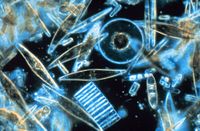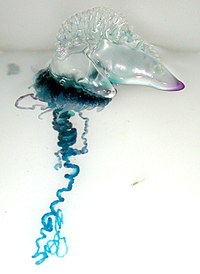
Expanding the upper‐temperature boundary for the microalga Picochlorum sp. (BPE23) by adaptive laboratory evolution
Sign Up to like & getrecommendations! Published in 2022 at "Biotechnology Journal"
DOI: 10.1002/biot.202100659
Abstract: Closed photobioreactors reach temperatures that reduce microalgal production or even cause culture collapses. Cooling can maintain the temperature within tolerable boundaries, but cooling is energy‐intensive and expensive. Thermotolerant microalgal strains can reduce dependence on such… read more here.
Keywords: temperature; laboratory evolution; adaptive laboratory; picochlorum bpe23 ... See more keywords

Application of adaptive laboratory evolution to overcome a flux limitation in an Escherichia coli production strain
Sign Up to like & getrecommendations! Published in 2018 at "Biotechnology and Bioengineering"
DOI: 10.1002/bit.26568
Abstract: Gene deletion strategies using flux balance analysis (FBA) have improved the growth‐coupled production of various compounds. However, the productivities were often below the expectation because the cells failed to adapt to these genetic perturbations. Here,… read more here.
Keywords: strain; adaptive laboratory; production; laboratory evolution ... See more keywords

Adaptive laboratory evolution for increased temperature tolerance of the diatom Nitzschia inconspicua
Sign Up to like & getrecommendations! Published in 2022 at "MicrobiologyOpen"
DOI: 10.1002/mbo3.1343
Abstract: Outdoor microalgal cultivation for the production of valuable biofuels and bioproducts typically requires high insolation and strains with high thermal (>37°C) tolerance. While some strains are naturally thermotolerant, other strains of interest require improved performance… read more here.
Keywords: adaptive laboratory; diatom nitzschia; temperature; laboratory evolution ... See more keywords

An Adaptive Laboratory Evolution Method to Accelerate Autotrophic Metabolism.
Sign Up to like & getrecommendations! Published in 2018 at "Methods in molecular biology"
DOI: 10.1007/978-1-4939-7295-1_10
Abstract: Adaptive laboratory evolution (ALE) is an approach enabling the development of novel characteristics in microbial strains via the application of a constant selection pressure. This method is also an efficient tool to acquire insights on… read more here.
Keywords: laboratory evolution; metabolism; method; autotrophic metabolism ... See more keywords

Adaptive laboratory evolution of Yarrowia lipolytica improves ferulic acid tolerance
Sign Up to like & getrecommendations! Published in 2021 at "Applied Microbiology and Biotechnology"
DOI: 10.1007/s00253-021-11130-3
Abstract: Abstract Yarrowia lipolytica strain is a promising cell factory for the conversion of lignocellulose to biofuels and bioproducts. Despite the inherent robustness of this strain, further improvements to lignocellulose-derived inhibitors toxicity tolerance of Y. lipolytica… read more here.
Keywords: evolution; tolerance; ferulic acid; strain ... See more keywords

Development of Thermotolerant Lactobacilli Cultures with Improved Probiotic Properties Using Adaptive Laboratory Evolution Method
Sign Up to like & getrecommendations! Published in 2022 at "Probiotics and Antimicrobial Proteins"
DOI: 10.1007/s12602-021-09892-3
Abstract: Probiotics play a significant role in functional foods. Heat stress and dehydration are the two principal mechanisms leading to inactivation and loss of probiotics viability in its production. There is a need to develop an… read more here.
Keywords: laboratory evolution; adaptive laboratory; acclimatized strains; development thermotolerant ... See more keywords

Miniaturized and automated adaptive laboratory evolution: Evolving Corynebacterium glutamicum towards an improved d-xylose utilization.
Sign Up to like & getrecommendations! Published in 2017 at "Bioresource technology"
DOI: 10.1016/j.biortech.2017.05.055
Abstract: Adaptive Laboratory Evolution (ALE) is increasingly being used as a technique for untargeted strain optimization. This work aimed at developing an automated and miniaturized ALE approach based on repetitive batch cultivations in microtiter plates. The… read more here.
Keywords: laboratory evolution; towards improved; glutamicum; corynebacterium glutamicum ... See more keywords

Development of multiple inhibitor tolerant yeast via adaptive laboratory evolution for sustainable bioethanol production.
Sign Up to like & getrecommendations! Published in 2021 at "Bioresource technology"
DOI: 10.1016/j.biortech.2021.126247
Abstract: The present research work aimed at developing robust yeast cell factory via adaptive laboratory evolution (ALE) for improved cellulosic bioethanol production. Kluyveromyces marxianus JKH5, a newly isolated thermotolerant ethanologenic yeast, was engineered by serial passaging… read more here.
Keywords: adaptive laboratory; via adaptive; yeast; bioethanol production ... See more keywords

Increased production of L-serine in Escherichia coli through Adaptive Laboratory Evolution.
Sign Up to like & getrecommendations! Published in 2017 at "Metabolic engineering"
DOI: 10.1016/j.ymben.2016.11.008
Abstract: L-serine is a promising building block biochemical with a high theoretical production yield from glucose. Toxicity of L-serine is however prohibitive for high-titer production in E. coli. Here, E. coli lacking L-serine degradation pathways was… read more here.
Keywords: adaptive laboratory; production; laboratory evolution; serine ... See more keywords

Application of Adaptive Laboratory Evolution in Lipid and Terpenoid Production in Yeast and Microalgae.
Sign Up to like & getrecommendations! Published in 2023 at "ACS synthetic biology"
DOI: 10.1021/acssynbio.3c00179
Abstract: Due to the complexity of metabolic and regulatory networks in microorganisms, it is difficult to obtain robust phenotypes through artificial rational design and genetic perturbation. Adaptive laboratory evolution (ALE) engineering plays an important role in… read more here.
Keywords: adaptive laboratory; laboratory evolution; production; yeast microalgae ... See more keywords

Adaptive laboratory evolution of a genome-reduced Escherichia coli
Sign Up to like & getrecommendations! Published in 2019 at "Nature Communications"
DOI: 10.1038/s41467-019-08888-6
Abstract: Synthetic biology aims to design and construct bacterial genomes harboring the minimum number of genes required for self-replicable life. However, the genome-reduced bacteria often show impaired growth under laboratory conditions that cannot be understood based… read more here.
Keywords: laboratory evolution; biology; laboratory; adaptive laboratory ... See more keywords